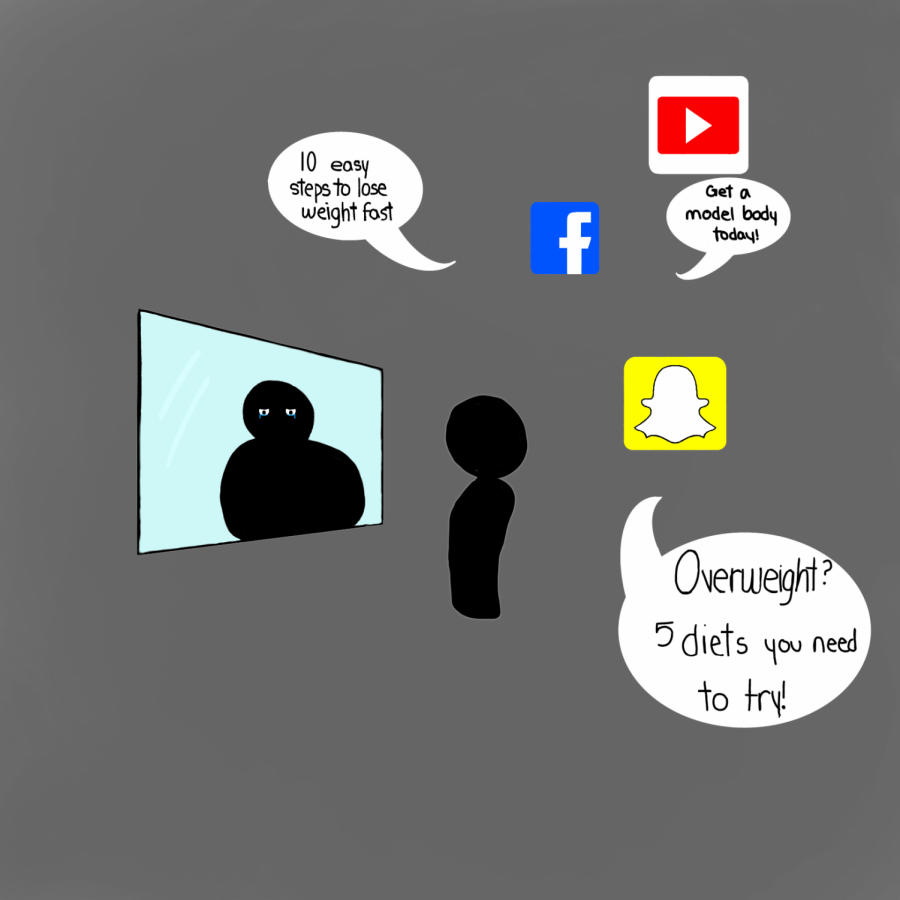The problem with “diet culture” from someone suffering with an eating disorder (Opinion)
Diet culture, fed through the media and hallways at school, has to end, especially for teenagers
Eating disorders are usually a hidden illness which are often a result of the pressure students put on themselves and others, amongst many reasons.
March 20, 2020
TRIGGER WARNING: This article discusses eating disorders and content that can be triggering to some readers. Viewer discretion is advised.
One of America’s largest and most successful industries, the weight loss industry, has been around for decades. And while the focus of the beauty industry is shifting to fix on a fit, healthy body, the fundamental idea behind weight loss and fitness, “diet culture,” is damaging to many, especially teenagers.
What is diet culture? Diet culture is the mindset that worships being thin. When one has been affected by these beliefs, they believe that the thinner they are, the healthier and more valuable they are. Diet culture is a lie, but with the overexposure to the media people in this modern age face, it is difficult for one to see it as anything but the truth.
I wish I could say that I never fell victim to these mindsets. Unfortunately, I did.
I suffer from an eating disorder in which I am tempted to heavily restrict my food intake in an attempt to reach a weight that is unhealthy and dangerous for my height and age. It feels like I’m being possessed by a demon, but I’m not, because these thoughts are entirely my own. And though these last few weeks I’ve tried my hardest to fight this, I find myself unable to banish my disordered mindset. One of the biggest reasons why I can’t seem to escape my illness is the fact that the media is constantly feeding me with unhealthy thoughts.
What kind of a sick world do I live in where I have been taught that I’m only worthy of love when I have an underweight body? I live in a world where every other advertisement is about weight loss, where my social media feed is filled with cleverly photoshopped models, a world where I can rarely go to the school bathroom without overhearing girls talking about how their normal and healthy bodies look “fat.” I live in a world where it is socially acceptable to talk about skipping meals, where people are praised for it and told they’re being “healthy.”
When did life become ruled by numbers? The number on the scale, the calories, the macronutrients; these are what have replaced happiness, fulfillment, and self-love.
Can you imagine the mental agony of trying to exterminate these disordered thoughts only to walk through the halls of your high school and hear something that triggers you into a backwards spiral? To most, this probably doesn’t seem like a significant problem. With the widespread popularity of diet culture, speech encouraging disordered behaviors is normal. But eating disorder sufferers are hypersensitive to these words. The inconsiderate conversations about dieting are hindering us from living our lives to their full potentials.
This has to stop. We have to stop bragging about how we haven’t eaten breakfast, or that we’ve lost five pounds when we’re supposed to be growing teenagers. We have to stop spreading hate and peer pressure to change our appearances, for these words and these thoughts only lead to months and years of anguish and tribulation that is an eating disorder.
It is our responsibility as young adults to bring change to our world, and it begins here, and now. We can do it; we can spread values of self-love and hope.
And if you are suffering through eating like I have been, remember: you are strong enough to fight this — so please keep fighting.
This idea of a “diet culture” has to end.



anonymous • Mar 20, 2020 at 11:13 am
as someone who suffers from the same problem, i feel this article was very needed, and it went into detail on what needs to stop. more people need to see this.
Rachel Long • Mar 20, 2020 at 9:54 am
Wow! What a powerful piece. I agree that it is nearly impossible to escape this culture. Readers, please head these words and think before you speak. Writer, never stop fighting. You can do it!